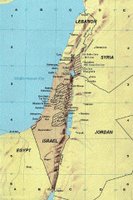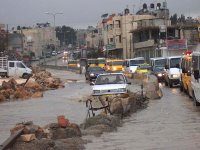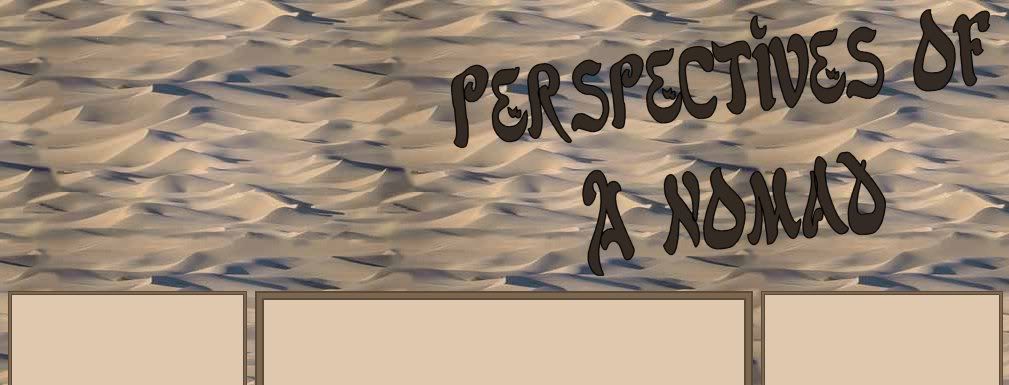Sunday, May 14, 2006
Real Solutions between Israel and Palestine
 Hi all, I’m back from my high school reunion with pictures, stories and memories, which I’ll try to only bore you with occasionally. But before I get into that stuff, there are a couple posts I want to get to.
Hi all, I’m back from my high school reunion with pictures, stories and memories, which I’ll try to only bore you with occasionally. But before I get into that stuff, there are a couple posts I want to get to.
During the reunion party, I was having a fascinating conversation about the politics of Israel, and developed upon a theory I spoke of when I first started writing this blog about why present peace proposals continue to get rejected, and a potential solution that speaks to the real issues that maintain the level of hostility between these two people.
Needs of the Palestinian People
During my years in Israel, I interacted with many Palestinian people, nearly on a daily basis. The vast majority were willing to make sacrifices to have a homeland again. Most renounced the violence, though many said that it was the only way they could further their cause. And they all spoke on a national pride, of a return to a time when they controlled Jerusalem.
 Jerusalem
Jerusalem
But interestingly enough most spoke of Jerusalem in economic terms, as opposed to religious terms. Of course there is a huge amount of awe and affection for the Dome of the Rock, but many spoke of the thousands or even millions of tourists that the Dome draws every year, and the admiration and traded afforded Palestine as keepers of the holy place.
Jerusalem is in many senses a commercial center for the Palestinians, with huge percentages of Palestine’s trade moving through the city. The ancient nature of the city as well as its fortification led to a respect for the city that Palestine has translated into an economy since its inception. I believe that, while the Muslim community outside of Israel demands control over the Holy city, the Palestinians only wants the respect attached to it.
The Real Jerusalem Problem
 As Israel promises to provide Palestine with a country consisting of the West Bank and Gaza Strip, it has become obvious that Jerusalem will never be returned willingly to the Palestinian people. Without Jerusalem, the Palestinian people are provided with land with minimal fertility, natural resources or ability to sustain life. Israel’s promises to provide funds and irrigation appear as handouts to children who can’t thrive on their own.
As Israel promises to provide Palestine with a country consisting of the West Bank and Gaza Strip, it has become obvious that Jerusalem will never be returned willingly to the Palestinian people. Without Jerusalem, the Palestinian people are provided with land with minimal fertility, natural resources or ability to sustain life. Israel’s promises to provide funds and irrigation appear as handouts to children who can’t thrive on their own.
But would an agreement be possible if the offer included a means for the Palestinian people to develop their own autonomous economy? My first project in Israel was helping create two autonomous economies for the Israeli and Palestinian people, and I saw first hand that with even small investments in Palestine’s economy, the economy blossomed and tensions eased. Dignity is a powerful force, and can transform a society.
That feeling quickly evaporated in 2000, but the memories don’t fade so quickly, and I truly believe that, if Israel not only provided Palestine with a country comprised of the West Bank and Gaza Strip, but also provided the Palestinian people with the means to rebuild their economy, real strides could be made towards peace between the two people.
An Original Solution?
 My belief is that, along with returning land to the Palestinians, Israel should pay to build the infrastructure for one city, which should probably be Hebron, or al-Khalil to Islam, the oldest city in the world. The city has nearly as much significance to the Muslim community as Jerusalem itself, and if properly rebuilt, could draw the same tourism as was drawn by Jerusalem, even more in the “novel” stage.
My belief is that, along with returning land to the Palestinians, Israel should pay to build the infrastructure for one city, which should probably be Hebron, or al-Khalil to Islam, the oldest city in the world. The city has nearly as much significance to the Muslim community as Jerusalem itself, and if properly rebuilt, could draw the same tourism as was drawn by Jerusalem, even more in the “novel” stage.
The Process
The funds to pay for the city should be provided both by Israel and by the Jewish Diaspora community, as in many ways, Israel serves as a safe haven for all Jewish people everywhere, and as such all of Judaism owes Palestine some debt for retaking the ancient land of Canaan.
The international community as well holds some responsibility for the present dilemma of the Palestinian people, and we must admit that when some Muslim leaders speak of US and EU favoritism for Israel, they are not necessarily wrong all of the time. Yes, sometimes we see the UN or EU countries come out against an Israeli action or decision, but more often then not they are sympathetic to the Israeli plight, as the US always is.
Still, some responsibility for the present displacement of the Palestinian people must fall on the Muslim world as well, who told them in 1948 to leave their homes while they swept the Zionist threat into the sea. The Muslim world has also used the Palestinian people and their leaders as pawns in a wide variety of conflicts over the years, further propagating the dilemma.
As such, the international community should be responsible to provide infrastructure between the city and major modes of transportation, allowing for the resumption of the tourist trade. And the Muslim community should be responsible for renovating Haram Ibrahim, the mosque signifying the tomb of Abraham. Anyway, only a mosque funded by the Muslim community would be visited by the Muslim community.
Rebuilding Dignity
 But while the money should be provided by these groups, the designs and the work needs to come from the Palestinian people. They need to rebuild the city from their own ideas, with their own creativity, and with their hard work, so they can rebuild their dignity at the same time. Not to mention the project will provide thousands of jobs and help grow the sluggish economy.
But while the money should be provided by these groups, the designs and the work needs to come from the Palestinian people. They need to rebuild the city from their own ideas, with their own creativity, and with their hard work, so they can rebuild their dignity at the same time. Not to mention the project will provide thousands of jobs and help grow the sluggish economy.
Yes, there are security concerns over providing the Palestinian people with funds and/or building supplies. And yes, there are many logistics that would need to be worked out to make a program like this feasible. But we need to get at the roots of the problems between Palestine and Israel, the problems will continue to grow and escalate, and to do so we need to start thinking outside the box. This is one possible way to do so.
technorati tags: Israel, Palestine, Politics, Peace, Islam, Jerusalem, Hebron, al-Khalil,
Posted by Scottage at 7:19 PM /
| |



 Hi all, I’m back from my high school reunion with pictures, stories and memories, which I’ll try to only bore you with occasionally. But before I get into that stuff, there are a couple posts I want to get to.
Hi all, I’m back from my high school reunion with pictures, stories and memories, which I’ll try to only bore you with occasionally. But before I get into that stuff, there are a couple posts I want to get to.  Jerusalem
Jerusalem As Israel promises to provide Palestine with a country consisting of the West Bank and Gaza Strip, it has become obvious that Jerusalem will never be returned willingly to the Palestinian people. Without Jerusalem, the Palestinian people are provided with land with minimal fertility, natural resources or ability to sustain life. Israel’s promises to provide funds and irrigation appear as handouts to children who can’t thrive on their own.
As Israel promises to provide Palestine with a country consisting of the West Bank and Gaza Strip, it has become obvious that Jerusalem will never be returned willingly to the Palestinian people. Without Jerusalem, the Palestinian people are provided with land with minimal fertility, natural resources or ability to sustain life. Israel’s promises to provide funds and irrigation appear as handouts to children who can’t thrive on their own. My belief is that, along with returning land to the Palestinians, Israel should pay to build the infrastructure for one city, which should probably be Hebron, or al-Khalil to Islam, the oldest city in the world. The city has nearly as much significance to the Muslim community as Jerusalem itself, and if properly rebuilt, could draw the same tourism as was drawn by Jerusalem, even more in the “novel” stage.
My belief is that, along with returning land to the Palestinians, Israel should pay to build the infrastructure for one city, which should probably be Hebron, or al-Khalil to Islam, the oldest city in the world. The city has nearly as much significance to the Muslim community as Jerusalem itself, and if properly rebuilt, could draw the same tourism as was drawn by Jerusalem, even more in the “novel” stage. But while the money should be provided by these groups, the designs and the work needs to come from the Palestinian people. They need to rebuild the city from their own ideas, with their own creativity, and with their hard work, so they can rebuild their dignity at the same time. Not to mention the project will provide thousands of jobs and help grow the sluggish economy.
But while the money should be provided by these groups, the designs and the work needs to come from the Palestinian people. They need to rebuild the city from their own ideas, with their own creativity, and with their hard work, so they can rebuild their dignity at the same time. Not to mention the project will provide thousands of jobs and help grow the sluggish economy. 